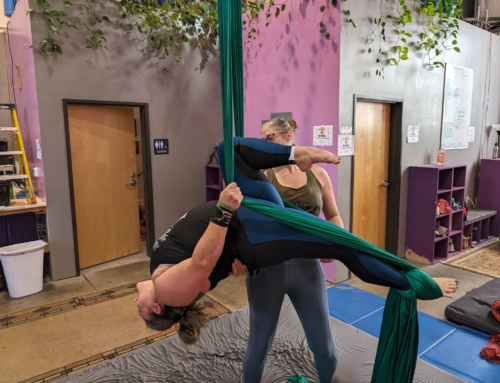So I went about 26.2 miles out of my comfort zone recently and did a solo, video streamed presentation at the Training Peaks office in Boulder. I’m becoming a better public speaker, but holy cow: if I had $10.00 for every time I said, “um” in this presentation, I’d be able to buy the new West End sectional I’m coveting for our family room.
The video is about 30 minutes long—and it’s far from Jimmy Fallon and the Roots playing Blurred Lines—so I’m not going to be hurt if you don’t watch. I’ve included my Cliff Notes below (some of them are cribbed from the10 Commandments for Running Mothers).
1. Accept the fact that running is hard. The paybacks, as you likely know, are excellent—strength, confidence, patience, efficiency, badass legs, mental equilibrium—but all those lovely attributes come at a cost. Namely, gasping breath, burning legs, and a constant questioning of why you’re doing this. If you can just accept that you’re going to mildly suffer for a few miles because you get this monumental payback, the whole shebang will just feel easier.
2. There is a very important difference between good and good enough. Make the former your baseline goal for every outing, and enjoy the good—and delicious—runs when they decide to grace you with their magical powers. And give yourself a really generous grace period when something really significant in your life happens. You have a kid, you change a job, you get divorced, you lose a loved one. A good enough run, in these cases, isn’t just good enough: it’s freakin’ great.
3. While running isn’t always enjoyable—I only really enjoy a run after it’s done—it shouldn’t be stressful. There are enough things in your life that can potentially cause anxiety. Pre-race butterflies? Certainly. Dread for every race (and run)? Time to reevaluate your goals.
4. To find a closer version of an enjoyable run, take away the numbers. At least once weekly, forgo the your Garmin, similar GPS, or watch and just run to run. Tune into yourself—instead of into your numbers—and you’ll be surprised at what you feel. (Could that be joy? Or at least some really strong quads?)
5. I can’t remember this one, and my chicken scratched notes aren’t helping me here. So if you watch the video, please let me know in the comments below what point I missed here. Thank you. I’m pretty sure it’s nobody cares about your finishing times but you, but not 100% sure of that.
6. Pick a goal that feels interesting and delicious for you; could be a mud run, could be a monumental run. If 26.2 feels like a big drag, the training will be one on your body and mind. FYI: The word “marathon” is not in the definition of runner, which is, according to our pals at Merriam-Webster, “one who runs.”
7. If your interesting, delicious goal feels slightly daunting to you, a coach can be your most valuable piece of equipment. Not only does she keep you accountable and running the appropriate distances and paces, but you can put all your issues—injuries, sickness, sleepness nights, travel—on her shoulders to deal with. All you have to do is run.
8.I f you have a crappy race—and we all have them—we give you permission to FB about it, be pissed about it, cry about it, be blue about it for exactly 24 hours. And then you have to get over it—and yourself.
9. Self-care begets self-care. You rally for a run, and almost magically, things in your life fall into place more easily. You eat better, you sleep more soundly, you realize that your needs shouldn’t be subterranean just because you’ve got a bunch of people in your nest.
10. Don’t think; just go. Early morning runs are usually easiest, but motivation can be hard to find when the bed is warm and the sky is pitch black. Lay out your clothes and anything else you need — pre-run banana, water, Garmin — the night before, and when the alarm goes off, say to yourself, “Don’t think, just go.” Then do it. (The same four words also work when it’s later in the day and your kids are begging you not to run. Don’t think about guilt. We promise: They’ll survive the hour or so you’re gone.)
There are more running truths than there are miles in an ultramarathon; what truths would you add?










Anyone can be a runner. It takes more mental toughness than physical prowess.
I love these — it would make a great poster!
Take the word “only” out of your answer to “How far did you run?” I’m guilty of it myself around high-mileage runners and cringe when beginning runners use it. Remember that “only a mile” is more than the majority of people and better than nothing!
This webcast was very encouraging to me and the “um’s typically bother me but I did not even notice!
I’m not sure…#5 was the pick an appropriate goal for you and the discussion that you are a runner regardless of whether you do a marathon. #6 The coach was mentioned here also and how to fit everything in. #7 Nobody cares about your finishing time. They care if you cheer them on and what kind of person you are…not your times.
“You are so much more than your numbers.”
Loved this video! I love your heart behind the sports and teaching other women to learn to love it and give themselves a break.
Dimity, are you in my head? Love “the word ‘marathon’ is not in the definition of runner.”
I read this late last night and that first image (some beats none) is what finally got me out of bed this morning. Thank you for the motivation!
I love the ‘some beats none’.
One thing I say to people who think they can’t run a race, of any distance, even a 5k, I tell them to go spectate a race. They will see the people on the course and will hopefully be encouraged by ‘if they can do it, so can I.’
I’m lapping everyone sitting on the couch.
Right now, I could just hug you for saying , “While running isn’t always enjoyable—I only really enjoy a run after it’s done— “. For me, running has always been hard; the elusive “runners high” a mere myth. The run has always been as much a mental challenge, as a physical one, and it is such a relief to hear someone else say, it’s really only the end that’s enjoyable. Thank you, thank you!
My mom told me to read this before I went for my first run without her; she has a torn meniscus and unfortunately will not be running for a while. This was a true inspiration for all of us runners!!! Number ten, “Don’t think, just go” was very helpful!! one of the hardest parts of running for m is waking up in the early morning before any sane people are out, but I love it. I will be sure to tell myself “Don’t think, just go” the next time I go for a run by myself.
I know that sometimes I feel pressured when I an talking to another runner, since I’m only thirteen, I feel like I have to say “I only ran a half marathon but… it counts right?” I know I can get really self conscious and I am positive tis will help with my fear of running alone and with new people.
Thank you so much for these helpful tips!!!!
Thanks!!! LOVED this. perfect timing too….struggling with some running right now!! Hell yeh. SOME beats nothing!!! And here is to no more ONLYs (only a half i always say….yikes…agreed no more)
So needed this today. Thank you!